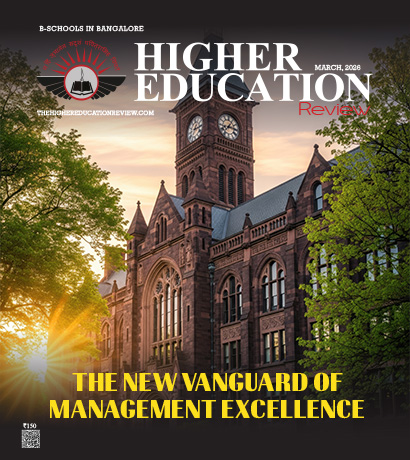How Soft Skills and Culture Fit Are Redefining Modern Hiring
 Ruchi Mago, Head Human Resources, Orange Business in an interaction with Higher Education Review shared her views on how important are soft skills compared to technical expertise in the hiring process, how to identify leadership potential during interviews or assessments, steps taken to reduce bias and ensure fair hiring decisions.
Ruchi Mago, Head Human Resources, Orange Business in an interaction with Higher Education Review shared her views on how important are soft skills compared to technical expertise in the hiring process, how to identify leadership potential during interviews or assessments, steps taken to reduce bias and ensure fair hiring decisions.
Ruchi Mago is a dynamic HR leader with more than 20 years of experience across all facets of human resources. From managing various regional and global portfolios, she currently heads the Human Resources and Employee Experience team for Orange Business India and is also the APAC Diversity Lead.
What factors help you decide between multiple equally qualified candidates?
When faced with multiple equally qualified candidates, we look at them holistically. Our process is rooted in “competency-based hiring”, involving diverse interview panels to gain multiple perspectives. We look for more than just technical skills - we seek individuals with the right attitude, behavior, and a growth mindset. For us, it’s about hiring for a future, not just a role. We want people who see their career as a journey, with the potential to grow and evolve within our organization. It’s about identifying those who can bring fresh energy, influence, and leadership, even before they formally step into those roles. For us candidates to fit in the culture of organization are key and a potential to grow with us is what we really want.
How important are soft skills compared to technical expertise in your hiring process?
Success is always a blend of both. Technical skills open the door, but soft skills open the entire house. It’s about understanding how a person approaches challenges - are they collaborative, adaptable, digitally literate, and strategic? Do they influence without authority? Do they have a growth mindset and a genuine curiosity to learn? These qualities often determine how well someone will thrive, lead, and inspire others. For us, potential isn’t just about what you know today; it’s about how you grow, connect, and contribute to our culture. We seek candidates who can genuinely embrace our culture and values of being Bold, Caring, and Responsible. For us, it’s not just about “what” they will accomplish, but equally important is “how” they approach their work - because soft skills play a vital role in shaping that mindset and behavior.
Do you consider social media presence or online reputation when evaluating candidates?
Yes, social media presence and online reputation matter, but not in a superficial way. We don’t judge profiles or posts; instead, we look for alignment with our core values during reference and background checks. It is about understanding the person’s integrity, purpose, and how they represent themselves. We believe that a person’s online footprint, combined with their real-world actions, paints a fuller picture of who they are and whether they’ll thrive in our culture of trust and purpose.
How do you align recruitment strategies with the company’s long-term goals?
Our approach to recruitment is strategic and future-focused. We believe that hiring isn’t just about filling current vacancies; it’s about shaping our future. We engage in long-term HR planning, constantly anticipating the skills our company will need as we grow and evolve. We look at our existing talent pool, current skills we have , identify skills gaps, and decide whether to build capabilities internally or bring in fresh perspectives from outside (build vs buy strategy). It’s about aligning every hire with our vision—hiring for potential, adaptability, and a shared purpose. This mindset helps us create a resilient, innovative workforce ready to face tomorrow’s challenges.
What steps do you take to reduce bias and ensure fair hiring decisions?
Fairness and objectivity are at the heart of our hiring process. We invest in behavioral training for managers and raise awareness about unconscious bias. Our culture promotes fairness, transparency, and meritocracy. Multiple interviewers in panels help us see beyond biases and get a balanced view. For us, experience is key, but it’s equally important that the candidate’s values and potential align with our organization’s ethos. We want to create opportunities for everyone based on their true merit.
How do you identify leadership potential during interviews or assessments?
Leadership isn’t just about titles; it’s about how individuals handle situations, influence others, and embody our values. During interviews, we focus on real-life scenarios - how candidates think, react, and communicate. We look for alignment in their behavior, their ability to inspire trust, and their willingness to learn. Sometimes, we involve future peers in the process, because leadership is also about cultural fit and the ability to collaborate.
We believe that true leaders are those who can adapt, influence, and grow with us. We seek "Humbitious" leaders - those who are humble yet ambitious. They are team-oriented, dedicated to helping their teams thrive, and committed to building a high-performance culture that puts people at the center. At the same time, they are growth-driven, have a strong appetite for profitability, and are bold enough to lead transformation initiatives and embrace the ever-changing, "never normal" landscape.
What changes have you noticed in hiring trends post-pandemic or with remote work culture?
Post-pandemic and with the rise of remote work culture, I have observed significant shifts in hiring trends. Skills have moved to the forefront, especially adaptability, digital literacy, emotional intelligence and future readiness. We now prioritize candidates who demonstrate a growth mindset and the ability to thrive in a flexible, virtual environment. The focus has shifted from traditional credentials to qualities like resilience, self-motivation, and the ability to collaborate across distances. Additionally, diversity, inclusion, and psychological safety are now fundamental criteria in our hiring process, reflecting the evolving workplace where trust, continuous learning, and purpose-driven work are key to success. Overall, hiring has become more holistic, emphasizing potential and cultural fit alongside technical expertise.

